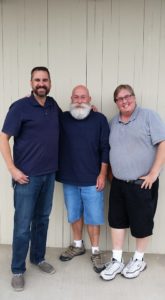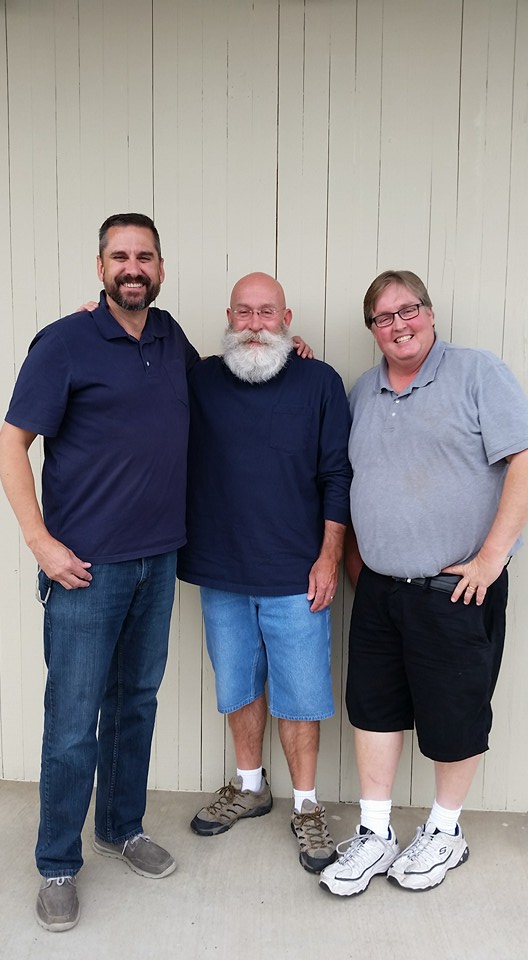 This episode continues a conversation with one of the panelists from the previous installment, Kim B Puzey. Picking up where we left off in his life story, it explores with Kim more about how he joyfully orients toward Spirit and what is most valuable even as his life has been full of struggle and pain, such as the loss of his father at an early age, long battles with depression, deep feelings of existential angst, and much more. Kim has emerged from this life of questioning and learning from difficulties with a fantastic sense of peace that naturally draws many to him, as they find in him an authentic and thoughtful mentor and model for a spiritual journey well walked. Friend of the podcast, Kevin Kapp, joins Mormon Matters host Dan Wotherspoon in interviewing Kim.
This episode continues a conversation with one of the panelists from the previous installment, Kim B Puzey. Picking up where we left off in his life story, it explores with Kim more about how he joyfully orients toward Spirit and what is most valuable even as his life has been full of struggle and pain, such as the loss of his father at an early age, long battles with depression, deep feelings of existential angst, and much more. Kim has emerged from this life of questioning and learning from difficulties with a fantastic sense of peace that naturally draws many to him, as they find in him an authentic and thoughtful mentor and model for a spiritual journey well walked. Friend of the podcast, Kevin Kapp, joins Mormon Matters host Dan Wotherspoon in interviewing Kim.
Please listen and share your questions and thoughts in the comments section below!
_____
Link:
M. Sue Bergin, “Keeping the Faith,” BYU Magazine (Spring 2014). Mentions Kim and some of the faith development dynamics in his family.


Comments 7
I loved this podcast. Thank you!
Kim is indeed an interesting person who has given time and great thought to understanding life and himself. Dan, your closing comments reminded me of a quote I heard in 1965 at BYU from Stephen Covey that he attributed to the deceased UN Secretary General Dag Hammarskjold from Sweden, “Your ability to love the masses is dependent on your ability to love one unlovable person “
Author
Thanks, so much, for this quotation! Totally nails the Idea I was trying to get across!
I’m still not understanding how Kim dealt with learning the church was not historically or factually true. Is he subscribing to the metaphor theory? or the “no other good alternative” theory?
I think Dan’s question to Kim really highlights the problem. Dan asked why Kim can’t question the church’s doctrine publicly. Dan replies that he says what he wants but never challenges the status quo.
I see mormons struggling to claim they can speak out. To an outsider, that’s not speaking out when you can’t publicly challenge the status quo.
Author
Thanks for jumping into the conversation, Jay!
I’ll kind of speak for Kim here, but I certainly want him to come on and respond as well (and distance himself from something he may not agree with). And please know that everything I offer below is in the hope of more conversation rather than shutting it down.
Kim and I both speak out in church and in wider Mormon circles, but we also recognize that the goal of speaking out is also to be “heard” and to have one’s ideas and takes (and what we sense are powerful ways of viewing things) considered. Phrasing something as “challenging the status quo” is to suggest speaking AGAINST something. My experience is the best way for truths or the better idea to be conveyed is through positive framings. Certainly others can and will sometimes see things we say as challenging to their worldview or perhaps their sense of where the church body mostly is, but by framing it positively, within our own experience and spiritual dives, offering it for consideration rather then direct critique allow folks like Kim and I and our ideas and ways of being Mormon to be received well by those around us (or at least quite a bit more who are around us than we would otherwise.)
I somewhat recognize the terms you use as ways that Kim (or I, I’m guessing you much think?) stay Mormon when we know all the historical/factual problems, but neither comes very close to what I sense is going on with us for neither of your two really allow very easily room for what we both claim: we’ve had undeniable, powerful, existential-ground-altering spiritual experiences. Many have come within Mormon framings while we’ve pondered teachings or read scripture or served in our communities. With these as part of our soul experience, we recognize even in the tedium of what passes for lessons and teaching on Sundays and over conference pulpits that there are powerful spiritual currents that run below these. That’s what we seek to lift up and hopefully inspire others to want to take similar dives into these things. We stay because this is “our” religion, our people, and the religion within which we met God/Spirit ourselves in these powerful ways.
Certainly, much in Mormonism, as in every religion, we know is mythic. But stories, especially myths, are conveyers of deep truths or important warnings, and more importantly often point persons towards the hero’s journey and the discovery of deep spirit and transformation themselves. Whether or not something is “true” in some kind of correspondence theory/factual way hardly ever enters into this kind of journey as the experiences, if nothing else, teach us that there’s no language possible for expressing the experience, and that the experiences keep yielding more and more depth and layers as we revisit them. Asking scientific/factual questions of religious things is to make a category mistake. These questions will never yield satisfying answers. Many religious people don’t recognize this mistake as they make it over and over again themselves and books try again and again to “answer” questions of this type. Still, check it out: ALL religions ultimately tell people to go to the Source themselves, to the Fire, to Spirit, to try to have experiences with the ground of all things for themselves. As one gets a taste of that, even just a hint, questions of these types quicly show their limits.
A couple of famous poems (the second one just a small fragment) related to this:
“Out beyond ideas of wrongdoing
and rightdoing there is a field.
I’ll meet you there.
When the soul lies down in that grass
the world is too full to talk about.” –Rumi
—
A song of the rolling earth, and of words according,
Were you thinking that those were the words,
those upright lines?
those curves, angles, dots?
No, those are not the words, the substantial
words are in the ground
and sea,
They are in the air, they are in you.
Were you thinking that those were the words,
those delicious sounds
out of your friends’ mouths?
No, the real words are more delicious than they.
. . .
I swear I will never henceforth have to do with
the faith that tells
the best,
I will have to do only with that faith that leaves
the best untold.
–Walt Whitman
Thanks, again, for jumping in with us here! Glad you listen and think enough of us to engage! Let’s keep it going if you’d like to!
Appreciated these last two podcasts. Reminds me so something I reas in the Ensign years ago. The sonnet is the most restrictive poetic form, yet it produces beautiful poetry that has endured!
I love how Kim has changed his views to encompass more than the rigid LDS view of things. I agree with what I perceive his position is–there’s room for more people than just those who “fit in” to the Bruce R McConkie paradigm, and that we have much more time to prove ourselves than the “80 years with luck or even less” we are afforded in this lifetime. However, how does he, or anyone else in this “Isle of Misfit Toys” reconcile this position with what the quorum of 15 say? They are much more McConkie-ish in their POV’s. They hold the keys to the car, they control where it’s going and they control the approved dialogue. They would say that Kim, I, and all the other misfits are wrong. So how do we “unseemlies” get to have positions that deviate from the correlated and whitewashed narrative, and still be OK? They say we’re wrong. They say when the prophet has spoken the thinking is over. Therefore, in the eyes of the gatekeepers, I am wrong to hold any position that isn’t in lock-step with theirs. I just don’t see how to reconcile what my heart tells me with their dogma. Don’t tell me not to take them too seriously, because they would never, could never, agree with that. They set the agenda, they define the rules, they determine the right and wrong, and if we don’t get in line, then we are unworthy. I simply don’t see a middle ground that works for both sides.